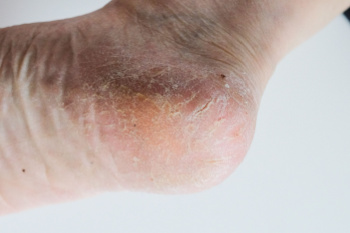September 2024

Swollen feet are a common discomfort during pregnancy, often caused by the body retaining extra fluid and pressure from the growing uterus. This extra pressure can affect blood flow, leading to fluid buildup in the lower extremities. Swelling of the feet and ankles is typically more noticeable later in the day or during advanced stages of pregnancy. While this is usually harmless, it can become uncomfortable and limit mobility. It is important to monitor sudden increases in swelling, as they may be a sign of a more serious condition, such as pre-eclampsia, which requires immediate medical attention. A podiatrist can assess your feet, offer guidance on managing discomfort, and suggest ways to alleviate pressure on the feet and ankles. This medically trained foot doctor can also evaluate whether the swelling is part of a typical pregnancy experience or if further intervention is necessary. If pregnancy is causing swollen feet and ankles, it is suggested that you make an appointment with a podiatrist for an exam, diagnosis, and treatment options.
Pregnant women with swollen feet can be treated with a variety of different methods that are readily available. For more information about other cures for swollen feet during pregnancy, consult with one of our doctors from New England Foot & Ankle . Our doctors will attend to all of your foot and ankle needs.
What Foot Problems Can Arise During Pregnancy?
One problem that can occur is overpronation, which occurs when the arch of the foot flattens and tends to roll inward. This can cause pain and discomfort in your heels while you’re walking or even just standing up, trying to support your baby.
Another problem is edema, or swelling in the extremities. This often affects the feet during pregnancy but tends to occur in the later stages.
How Can I Keep My Feet Healthy During Pregnancy?
- Wearing orthotics can provide extra support for the feet and help distribute weight evenly
- Minimize the amount of time spent walking barefoot
- Wear shoes with good arch support
- Wear shoes that allow for good circulation to the feet
- Elevate feet if you experience swelling
- Massage your feet
- Get regular, light exercise, such as walking, to promote blood circulation to the feet
If you have any questions please feel free to contact our offices located in Wakefield, MA, Nashua and Derry, NH . We offer the newest diagnostic and treatment technologies for all your foot and ankle needs.

Shoe orthotics are an important non-surgical treatment for hallux rigidus, a condition marked by a stiff, painful big toe joint. Before considering surgery, it is wise to explore orthotic options, as they can significantly alleviate symptoms and improve mobility. Custom-made orthotics help by redistributing pressure away from the affected joint, providing better arch support, and reducing pain during movement. They work by cushioning the foot and correcting abnormal gait patterns that worsen the condition. If you have a painful and stiff big toe, it is suggested that you consult a podiatrist to ensure that the orthotics are tailored to your specific needs.
If you are having discomfort in your feet and would like to try orthotics, contact one of our doctors from New England Foot & Ankle . Our doctors can provide the care you need to keep you pain-free and on your feet.
What Are Orthotics?
Orthotics are inserts you can place into your shoes to help with a variety of foot problems such as flat feet or foot pain. Orthotics provide relief and comfort for minor foot and heel pain but can’t correct serious biomechanical problems in your feet.
Over-the-Counter Inserts
Orthotics come in a wide variety of over-the-counter inserts that are used to treat foot pain, heel pain, and minor problems. For example, arch supports can be inserted into your shoes to help correct overarched or flat feet, while gel insoles are often used because they provide comfort and relief from foot and heel pain by alleviating pressure.
Prescription Orthotics
If over-the-counter inserts don’t work for you or if you have a more severe foot concern, it is possible to have your podiatrist prescribe custom orthotics. These high-quality inserts are designed to treat problems such as abnormal motion, plantar fasciitis, and severe forms of heel pain. They can even be used to help patients suffering from diabetes by treating foot ulcers and painful calluses and are usually molded to your feet individually, which allows them to provide full support and comfort.
If you are experiencing minor to severe foot or heel pain, it’s recommended to speak with your podiatrist about the possibilities of using orthotics. A podiatrist can determine which type of orthotic is right for you and allow you to take the first steps towards being pain-free.
If you have any questions please contact our offices located in Wakefield, MA, Nashua and Derry, NH . We offer the newest diagnostic and treatment technologies for all your foot and ankle needs.

Non-diabetic foot ulcers are open sores or wounds that occur on the feet, typically due to poor circulation, pressure, or injury. Unlike diabetic ulcers, these wounds are not directly caused by high blood sugar levels, but can still lead to severe complications if left untreated. These ulcers often develop from pressure points on the feet, especially in individuals with limited mobility or poor blood flow. Risk factors include age, obesity, peripheral artery disease, and wearing ill-fitting shoes. Recognizing a foot ulcer early is important. Look for persistent redness, swelling, and an open sore that does not heal. To prevent these ulcers, regularly inspect your feet, wear appropriate footwear, and manage any underlying conditions that affect circulation. Treatment involves cleaning the wound, relieving pressure with specialized footwear, and possibly using topical medications. If you notice you have developed a foot ulcer, it is suggested that you visit a podiatrist who can assess the ulcer's severity, provide targeted treatments, and suggest preventive strategies to avoid recurrence, ensuring optimal foot health.
Wound care is an important part in dealing with diabetes. If you have diabetes and a foot wound or would like more information about wound care for diabetics, consult with one of our doctors from New England Foot & Ankle . Our doctors will assess your condition and provide you with quality foot and ankle treatment.
What Is Wound Care?
Wound care is the practice of taking proper care of a wound. This can range from the smallest to the largest of wounds. While everyone can benefit from proper wound care, it is much more important for diabetics. Diabetics often suffer from poor blood circulation which causes wounds to heal much slower than they would in a non-diabetic.
What Is the Importance of Wound Care?
While it may not seem apparent with small ulcers on the foot, for diabetics, any size ulcer can become infected. Diabetics often also suffer from neuropathy, or nerve loss. This means they might not even feel when they have an ulcer on their foot. If the wound becomes severely infected, amputation may be necessary. Therefore, it is of the upmost importance to properly care for any and all foot wounds.
How to Care for Wounds
The best way to care for foot wounds is to prevent them. For diabetics, this means daily inspections of the feet for any signs of abnormalities or ulcers. It is also recommended to see a podiatrist several times a year for a foot inspection. If you do have an ulcer, run the wound under water to clear dirt from the wound; then apply antibiotic ointment to the wound and cover with a bandage. Bandages should be changed daily and keeping pressure off the wound is smart. It is advised to see a podiatrist, who can keep an eye on it.
If you have any questions, please feel free to contact our offices located in Wakefield, MA, Nashua and Derry, NH . We offer the newest diagnostic and treatment technologies for all your foot care needs.

Cracked heels, a common foot condition, often result from various risk factors and underlying causes. Dry skin is a primary contributor, often worsened by prolonged standing on hard surfaces. People with diabetes or other conditions affecting blood circulation are at increased risk of cracked heels. Wearing open-backed shoes, flip-flops, or high heels can place undue pressure on the heels, leading to cracks and fissures. Environmental factors, such as low humidity, can also strip moisture from the skin, making it more prone to cracking. Additionally, obesity adds extra weight, which can put additional stress on the heels. Regular moisturizing and wearing supportive, well-fitting footwear can help prevent and manage cracked heels. If you have cracked heels, it is suggested that you visit a podiatrist for treatment, which may include prescribed medication.
If the skin on your feet starts to crack, you may want to see a podiatrist to find treatment. If you have any concerns, contact one of our doctors from New England Foot & Ankle . Our doctors can provide the care you need to keep you pain-free and on your feet.
Cracked Heels
It is important to moisturize your cracked heels in order to prevent pain, bleeding, and infection. The reason cracked heels form is because the skin on the foot is too dry to support the immense pressure placed on them. When the foot expands, the dry skin on the foot begins to split.
Ways to Help Heal Them
- Invest in a good foot cream
- Try Using Petroleum Jelly
- Ease up on Soaps
- Drink Plenty of Water
Ways to Prevent Cracked Heels
- Moisturize After Showering
- Skip a Shower
- Keep Shower Water Lukewarm
- Don’t Scrub Your Feet
If you are unsure how to proceed in treating cracked heels, seek guidance from a podiatrist. Your doctor will help you with any questions or information you may need.
If you have any questions, please feel free to contact our offices located in Wakefield, MA, Nashua and Derry, NH . We offer the newest diagnostic and treatment technologies for all your foot care needs.

